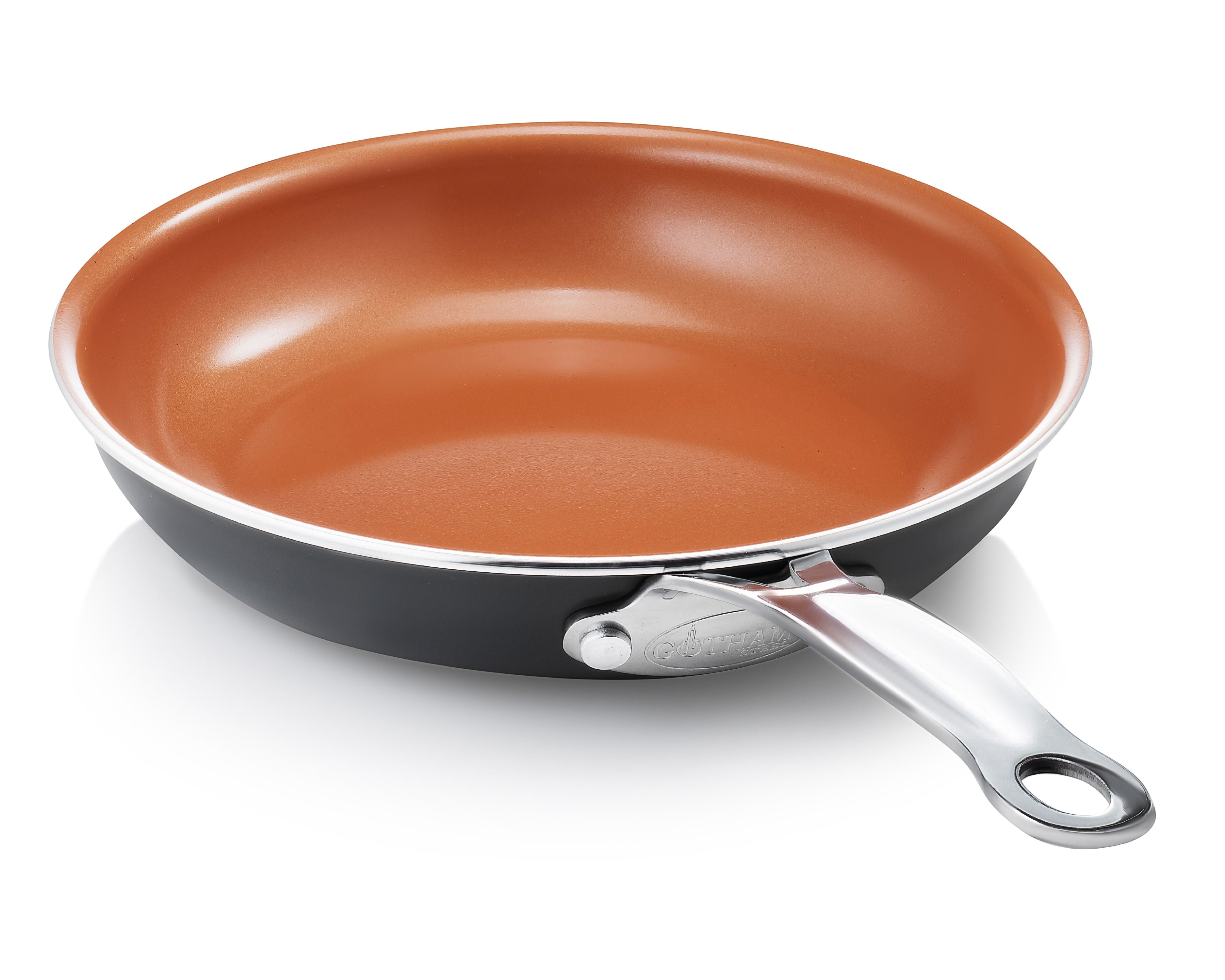Since titanium isn’t the best conductor of heat, it’s sometimes coated with copper or aluminum, both of which can potentially leak into food and cause health problems.

Benefits of Coated and Lined Copper Pans
Modern copper cookware generally has the luxe material on the outside with a stainless steel lining or core. These pots and pans lined with stainless steel are very durable. Tin is the traditional lining for copper. This is due to tin being very malleable, resistant to sticking, and since it will not react to acidic foods. Vintage brands of French copper cookware need to be relined with repeated use or over long periods of time as a precaution. Modern copper, especially when lined with durable stainless steel, does not require this step.
There is no doubt that copper cookware is an investment. Yet the return on investment is well worth the price. There are a few different avenues one can take in equipping their kitchen with the joys of copper. Begin to curate your collection with just a few pieces at a time, initially focusing on accenting rather than replacing. Or, if it is possible, treat yourself to an entire set of this superb cookware. For home gourmands, your pallet will thank you. Be sure to purchase high-quality, lined products for longer life and fewer risks.

CTA: Do you consider yourself a serious home chef? Check out these dazzling options for your kitchen!
It is wise to use gentle, non-abrasive utensils with your copper cookware if it is unlined or lined with tin. Think wood or silicone as they will not scratch the surface. Whether your cookware is lined with tin or unlined, copper pots and pans must be handled with care. A stainless steel lining is more durable and less susceptible to scratching. Either way, go easy on your copper cookware. After all, you have made an investment for your kitchen, and therefore it deserves some TLC.
Never, ever, put copper cookware in the dishwasher. It must be hand washed using gentle cleansers and never take an abrasive surface to this material! If it needs shining up, a solution of salt and vinegar will do the trick. In general, the combination of time, a soft cloth, and hot soapy water are your best friends when cleaning your copper cookware.
Try One With a Stainless Steel Lining
If you are looking for the best of both worlds, consider stainless steel lined copper cookware. Due to its reactive nature, unlined copper pots and pans have become rare for cooking. Modern options, such as the Prima Matera series, feature a copper exterior and stainless steel lining on the market. This combines the beauty of copper with the durability and safety of stainless steel. For those concerned with cooking performance, these options can take a lot more heat than their all-copper counterparts.An added bonus, there are induction-compatible versions of stainless lined copper cookware.
As copper cookware is a showpiece, keep it on display. Always be sure to thoroughly dry this material after cooking but keep it out for people to see. The best way to store copper cookware is to hang it from the walls or ceiling. If it is relegated to a cabinet, make sure to use some sort of protector to avoid scratching. Copper might be a great conductor, but it is also very soft thus susceptible to blemishes.
The Statue of Liberty is a prime example of what happens when copper oxidizes. To keep that gorgeous red-bronze shine from turning green, you will need to give your copper cookware some attention even when you aren’t using it. Lemon juice, table salt, and soft clothes are all you need to maintain the dazzling color and shine of your copper cookware. After every use, clean pots and pans with warm soapy water. Make sure they are dry, then use an additional cleaning method to keep your cookware beautiful.

WORST Cookware Lurking In Your Kitchen to Toss Right NOW | Dr. Steven Gundry
FAQ
Is titanium copper cookware safe?
What is the safest cookware for your health?
What are the disadvantages of titanium cookware?
Are copper pans non toxic?
Is titanium a safe material to use in cookware?
Yes, titanium is a safe material to use in cookware. It is a very stable, non-reactive metal. However, it is expensive, and is typically only added in small amounts to cookware, usually to nonstick cookware to improve durability (though, as we mentioned, it probably doesn’t improve durability very much).
Is copper cookware safe?
Copper cookware conducts heat well and contains copper, which similar to iron has nutritional value for people. Usually, this type of pan has a base made of another metal like stainless steel, with a copper coating over it. Copper can leach into to your food in amounts that aren’t safe to consume.
Can heat damage titanium cookware?
Heat can also cause damage to the surface of titanium cookware, leading to unwanted chemicals and metals leaching into your food and potentially causing health issues. Discussion of the impact of acidic and alkaline foods on titanium cookware.
Is titanium cookware dishwasher safe?
Because of titanium’s natural non stick qualities, this is much less of an issue. Rinsing your cookware with water and a mild detergent will usually be enough to remove any food residue. Some titanium cookware types are also dishwasher-safe.
